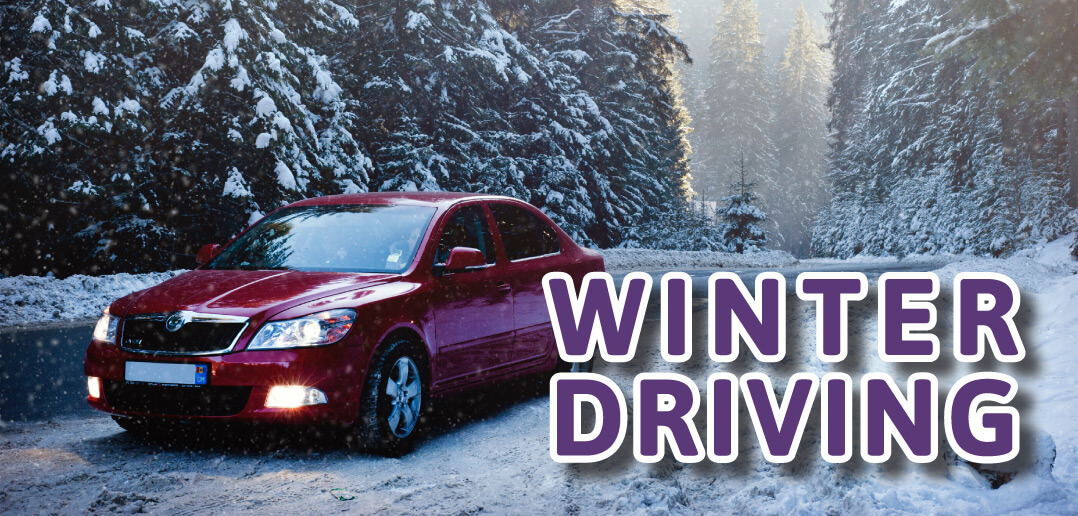Winter Driving in Lincoln, NE – 2018
No matter how long a person lives in Nebraska, the unpredictable weather here still seems to come as a bit of a shock. However, one thing we can predict is that winter hits us hard. We may not know when it’ll hit, but we know it surely will—and so it’s something we need to be prepared for, especially when it comes to our vehicles and navigating the roads in icy, slick conditions. Let’s review what we can do to prepare for road conditions that lie ahead of us for the next few months.
With the help of a few local experts, we’ve gathered some helpful information and tips for winter driving in Lincoln.
Winter Driving Tips
“Are you traveling for the holidays?” asks Chris Stock of inMOTION Auto Care. “With the flight delays, extended layovers, and high-ticket prices, more and more people are opting to drive if they are within six to eight hours of their holiday destination. Regardless of if you’re flying or driving, nothing ruins a trip more than not making it to your intended destination on time or missing the fun all together! While you can’t take all of the hazards out of holiday travel, inMOTION Auto Care has put together some tips to help make sure your holiday season goes as smooth as possible.
Before extended winter driving, have your oil changed and your vehicle inspected for any issues that may be creeping up. Fluid leaks, suspension issues and tire concerns (nails specifically) are what we find quite often.
Have your battery checked, if it has marginal cold cranking amps, have your technician load test the battery with a carbon pile tester. Newer batteries will not always give you the courtesy of a slow crank time before they fail.
Another point to think about while driving is your vehicle’s ABS system. This means anti-lock braking system. When using steady pressure on the brake pedal, ABS automatically applies a pumping action, faster than you ever could, at different pressures to each wheel. This reduces the chance of the brakes locking up causing sliding, loss of steering controls and the dreaded vehicle spin. While it is not a 100% guarantee that you will not slide, it is beneficial to help you slow down faster and with more control. One thing that people don’t know about the ABS system on their vehicles is that when the ABS light is on the dash, it will disable this safety feature! So, if you have a light on the dash, get that repaired before the weather turns sour to give you the maximum amount of traction and control to keep everyone with you and on the road with you as safe as possible.
Speaking of traction, another point commonly brought up during this time of year is tires. Tires are literally the only components of your vehicle that (should) touch the road. This means that they are incredibly important to maintain all year long, but increasing so in bad weather. Did you know that only about 10% of your tires are contacting the road at any given time? This makes it especially important to have tires with good tread on them to grip to the road and displace water to prevent hydroplaning. The less tread depth there is on a tire, the more likely you will experience issues with sliding, braking, and accelerating. For safety and handling, as of 2018, AAA is recommending that tires should be replaced at 4/32 of an inch. It is always free to check the tread depths of your tires, so this is one component that should never be overlooked.
One of the best ways to keep you and your loved ones safe this winter is the obvious: drive slower and more cautiously. This will improve the handling of your vehicle as well as give you more time to respond to anyone who is not following this advice. There are already enough people rushing and not paying attention on the road, why be one more? Remember, going five to 10 miles an hour faster on a 15-minute trip doesn’t do you any good if you have to wait three hours for a tow truck.”
Laurie Sain with Tracy’s Collision Center also confirmed that going slow is the best way to drive in the snow like a pro: “When driving on icy roads, start by slowing it down. We’re not just talking about how far you push the gas pedal. We’re talking about how fast you move your hands and feet. A lower-friction road surface means it takes more time for your tires to find grip and change your speed or direction.
While steering, if you feel the wheel ‘slip’ in your hands, that means the tires don’t have enough available traction to turn that hard, so unwind the wheel until the resistance feels normal. If you try to turn and nothing happens, straighten the wheel back out and slow down with a gentle, briefly press of the brake, then try again.
When driving in the winter, everything takes longer, particularly stopping and turning. So look farther down the road than you usually do and start breaking sooner.
However, no matter how cautious you are, you may still find yourself spinning out of control. If you do, don’t panic: You can regain the upper hand. Turn the wheel in the direction of your slide with a deliberate motion. Don’t give it more than about half a crank.
This isn’t instinctual—your brain feels the car slipping in one direction and logically wants to turn in the other direction to fix it—so it can be worthwhile to practice in a snow-covered empty parking lot somewhere. Most cars today have extremely well-developed stability-control systems, and if you turn the wheel slowly towards the slide and avoid stepping on the brake too hard, those systems will do a good job of straightening you out.”
“It also helps in avoiding sliding into curbs or even off the road into mailboxes, poles, or other stationary objects,” adds Dan Pape with Midtown Body & Paint. “This causes damage to not only to the body of the vehicle, generally on the fender, but can also damage the tire, impacting the alignment and suspension and causing even more damage when driven afterward. Every situation is different when there’s a collision, and there can potentially be damage that isn’t visible or apparent until later on down the line, so it’s beneficial to have your vehicle checked out as a result just to be on the safe side.”
Midtown Body & Paint, located at 332 S. Antelope Valley Pkwy., is a collision repair center with a tradition of excellence, serving clients in the Lincoln area since 1950. Staffed with professional auto body repair specialists who have extensive experience and training in framework and collision repair, Midtown Body & Paint quality auto body repair for all makes and models of vehicles. Whether you require major or minor auto body damage repair, Midtown Body & Paint is here to help.
Accidents Happen, Be Prepared
In the event of an accident, make sure you have a list of important details and contact information to keep in the glove box of each vehicle in your family. This could include your insurance agent, collision repair center, towing company, AAA membership information, emergency contact information, and even any existing medical conditions for responders. It’s good to have an actual written list in case your phone dies, doesn’t have internet connection, or gets damaged in the accident.
“Always have your agent’s name and direct reporting number on-hand,” agrees David Duff with Farm Bureau Financial Services. “Keep this information handy in your vehicle, and make sure you put an ICE (in case of emergency) list in the glove box of your teenage driver’s car too! This list should include names, phone numbers, and step-by-step directions for what to say and do.
In terms of insurance considerations, my advice is to review your current policy and coverage with your agent now, revising it as needed. Make sure you know your deductible and be sure roadside assistance is included in your coverage. Remember, you are not the only one on the road, that is why a review with your auto insurance agent is always important. You’ll not only know more about your coverage, but it’s also a great opportunity to adjust it if needed. Doing this before you get in an accident will relieve a little stress from an already high-stress situation.”
Attorney Matt Aerni with Berry Law Firm also cautions, “With winter comes the additional burden of driving in inclement weather. Everyone knows weather phenomenon such as sleet or snow make our vehicles handle much different than they do when those phenomenon are not present. Even though everyone knows that, we still see an increase in car crashes on the days when it is slick outside. Inclement weather may explain why a car crash happened, but it does not excuse the driving behavior of the person who causes the crash.
Even in winter weather, a driver has an obligation to keep their vehicle under control. When a driver slides into a snowy intersection and crashes into another car, the crash did not happen because of the snow. The crash happened because the driver did not reduce their speed in time to prevent their vehicle from sliding through an intersection the driver likely knew was slick, and that driver is going to be liable for any injuries they cause. So keep that in mind, and always remember to put the phone away while you are driving.”
Matt Moorhead of Shelter Insurance notes, “The main thing people want to know when they are in an ice-related accident is ‘Do I need to call the police?’ If there is an injury in the accident or a vehicle that is not drivable, I think that you should always call the police. Having this third party involved may result in someone getting a ticket but it will make things much easier in the long run. In minor instances when both parties agree not to call the police, the more information you can get the better. Find out the owner and driver of the car involved, and snap a photo of a valid insurance card for the vehicle, registration document, driver’s license, and even contact information of any passengers or witnesses so you’ll have access to that information when you need it. Then be sure to take pictures of the vehicle, including license plates and pictures of damage to both your car and other car. The more information you get the faster a claim can be handled.”
Sometimes accidents can’t be avoided, so prepare accordingly—make a winter emergency kit to keep in your car. This kit should include items for your health and safety, as well as items needed for your car.
“Keep a kit in the car with a blanket, first aid, flashlight, cell phone charger, jumper cables, a spare pair of gloves, ice scraper, small shovel, emergency flares, and anything that will be essential if you’re on your own or have your kids in the car,” emphasizes Nate Newcomer with ReNu Auto Services. “Particularly with the phone charger, check to ensure that your outlets will power it when the vehicle is off, and if that’s not the case, have a portable charger available. Also, kitty litter is high on list of items to help get you out of a bind if your vehicle gets stuck. Kitty litter is actually superior to salt; while it helps with traction, it won’t actually melt snow like salt does. Instead, it’ll just absorb it, resulting in more traction.”
Speaking of, it’s important to note that the salt that is applied to the roads to help deal with the snow and ice will turn even black cars a dirty white. Don’t attempt to wipe the salt off your vehicle without properly washing it first. Salt is very abrasive and, when rubbed into the finish, it will leave behind significant scratching. Salt can also corrode any exposed metal, so it’s essential to remove it as quickly as possible to prevent rust. Rinse your vehicle thoroughly before you begin washing to remove as much of the salt as possible to prevent it from being rubbed into the surface during the washing process.
If your vehicle does experience this kind of damage, it can be repaired.
Local Towing Company Spotlight
Headquartered in Lincoln, L.T.R. Towing & Recovery is locally owned and operated and has been serving clients nationwide since 1995. L.T.R.’s fleet is fully insured with WreckMaster certified operators and available 24/7 for local and long distance towing, recovery, and load shifts for cars, trucks, trailers, buses, motorcoaches, and RVs.
In addition, L.T.R. Towing & Recovery’s sister company, Stor-Trek, offers storage of RVs, boats, and other vehicles that you aren’t using this winter. Free up your driveway and take your unneeded vehicles to Stor-Trek’s 14-acre property at 6255 Cornhusker Hwy. A 12×40 spot starts at $45 per month; larger spaces and corresponding rates are available by request.
Car Accessories For Winter
There are accessories on the market today that are especially beneficial for use during winter/inclement weather, or in preparing one’s vehicle for the weather conditions we experience here in Nebraska.
“Remote starts are a hot ticket item this time of year,” states Robert Peinado with GP Customs. “With the technology expanding we are able to start our cars with a remote car starter. This will allow them to heat up, the windows will have time to defrost, and even kick on the heated seats! Some of the of the new cutting-edge technology for remote car starters is the ability to start the car from your smartphone, or even smart watch. Automated commands allow you to set an alarm and your car will start at a designated time each day. With this convenience, you should never have to experience a freezing uncomfortable vehicle again!”
Robert informed us that aftermarket heated seats at GP Customs are highly sought after in the winter. Their team can add heated seats to any vehicle, whether it has cloth or leather seating. This will enable you to keep your body warm, even under the worst conditions. For a free estimate on any services to keep your vehicle in a suitable condition for winter driving, give GP Customs a call.
An outlet for accessories, specifically for big rigs to light-duty pickups, is DPC Unlimited LLC. DPC Unlimited is utilizing over 40 years of combined experience in the diesel repair and trucking industry. The store was established to work in conjunction with an existing installation facility located at 7960 N. 56th St., STE B.
Short for Diesel Performance & Chrome, DPC Unlimited offers the diesel performance parts and tuning required for on- and off-road performance and fuel economy. They also have your chrome and truck accessory needs covered, from the front to the back and the top to the bottom. At DPC Unlimited you’ll find a vast selection of performance parts and accessories from many reputable manufacturers.
As a friendly reminder to all, the folks at Parkway 66 Services reminded us that regardless of the time of year or the type of vehicle, a regular maintenance service, such as spark plug and filter replacement, is critical for its proper functioning. With electronic control systems, your engine can now curb carbon emissions and increase fuel efficiency. Advanced control systems have taken the place of simple engine components; therefore, it’s even more important to have trained professionals looking into your vehicle problems. The team at Parkway 66 Service can handle all your major and minor auto repair needs—from brake services to auto heating and air repair services.
There’s certainly no avoiding the winter weather, and getting used to it seems pretty hopeless as well, but there are many ways that we can set ourselves up for success in safely navigating through these cold and sometimes dangerous conditions. Know who your local professionals are in order to stay safe, covered, and prepared this winter.









